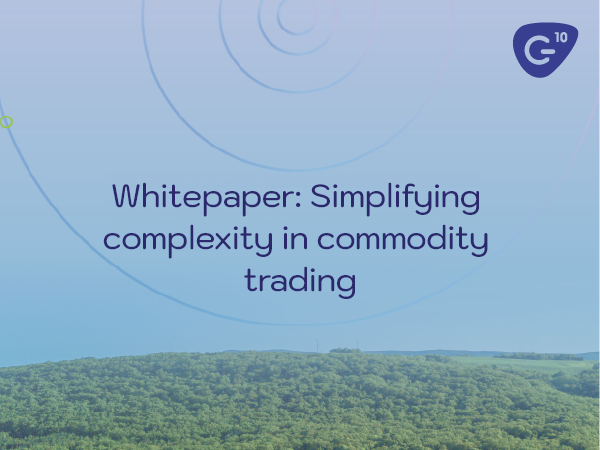At the recent Commodity Trading Week in London, the main thing we noticed was that ESG is still growing in importance when it comes to commodity trading. Last week, in part one of this write-up, we covered how the war in Ukraine is impacting ESG thinking and methodologies, as well as the importance of collaboration in ESG initiatives. Today, we will explore the discussions from the event around social responsibility and environmental considerations in commodities.
Social responsibility and human rights in supply chains
Co-mingling is more of a challenge in some supply chains than others. Whereas several agricultural commodities operate segregated supply chains or allow mass-balancing for sustainability certifications, in metals, organisations that avoid problematic practices themselves are still exposed to them due to co-mingling in the supply chain. According to multiple panellists, we have a responsibility to demand better, and data and tracking are the answer.
Every commodity needs a social licence to operate, and it is possible to meet our social obligations. Even within mining, responsible extraction is possible, but the challenge is that organisations need to hold themselves to a high ethical standard.
Legal standards for ethical behaviour vary based on where the company is headquartered and where they are operating. For example, extraction companies working in Canada need to negotiate an Impact Benefit Agreement listing their social and financial obligations to people living near the mine. This Agreement is a contract detailing how the economic value will be retained in the immediate area as well as any social impact.
But legal and contractual agreements can be less comprehensive depending on geography, Zambia and the Democratic Republic of Congo were highlighted as examples. And this is before the organisation runs into any problems on the ground.
One of the major challenges is that local communities may not have the luxury of choice. Projects that carry out impact assessments and perform thorough due diligence can take years longer to begin, and some communities can’t afford to wait. Added to this challenge is the fact that some communities, and even countries, simply don’t have the power to negotiate higher standards. The only way to solve this problem is to reach an international consensus and agree standards that are equitable for all.
Environmental considerations in commodities
The voluntary markets are moving quickly and are now expanding beyond carbon, particularly into areas such as biodiversity. But there are still many questions over voluntary carbon credits.
The first talking point on voluntary credits was that every credit represents the same one tonne of carbon dioxide, even though each project has a different impact in the real-world. We are therefore missing the ability to differentiate between credits, with one panellist arguing that a mature market would assign credit values as a range rather than a binary option.
There is, however, an expectation that carbon markets will become more standardised and commoditised, although there is still the potential for different classes of credits with prices representing their differing real-world impacts. And with carbon becoming a liability on business’ balance sheets, the price of carbon will drive change.
There are currently many green imperatives from across society, but the people creating them often don’t understand the complexities of trading commodities. For commodity traders, implementing them can therefore be a real advantage, but there is also a challenge in getting them into our systems. And once again, data was mentioned as a non-negotiable, as the only way to avoid greenwashing is with hard and reliable data.
However, small farms produce 80% of world’s food so traceability initiatives can put the reporting burden on some of the poorest and most vulnerable people in the supply chain. It’s therefore important that we consider what secondary data we can use for supply chain traceability and human rights.
For example, if your organisation sponsors a school in a farming area, the attendance data will show whether students have been in school rather than working on a farm. And there are many other data sources we can use, including insurance and geolocation data, but at the moment it isn’t integrated well and there is too much noise.
We need to be delivering value from this data to the farmers too. For one thing it’s their data and true sustainability means providing value to all parties, but also, farmers need an incentive to improve this data. And the other major challenge faced by too many commodities is how we translate the commercial value of sustainability back to farmers. Right now this is complicated by us not having a clear picture of the commercial value, but as data improves, a better picture is forming.
Conclusion
From human rights to biodiversity, commodity traders are actively working to solve a wide range of ESG issues in their supply chains. This is driven as much by internal factors as by consumer and stakeholder demand, but even with this will to act, we still have a long way to go.
ESG is an ever-evolving journey that is going to take more collaboration and more creative uses of data than ever before if we are to see the results we hope for. But we are making progress and it’s important to celebrate the successes along the way to maintain our momentum. And remember that collaboration helps entire value chains on their sustainability journey, none of us are in this alone.
Sustainability is not a zero-sum game. If we come together to collaborate on new standards and share the traceability data that our partners are so vocally in need of, we can all benefit, as can the people and communities that these ESG initiatives are trying to help most.
At Gen10, we believe that collaboration is the most effective tool in helping all in the commodities industry meet their ESG goals. Get in touch today to find out how our solutions drive collaboration and empower our clients to get better results from their data – for themselves and for the society they operate in.
Want to read more?
Subscribe now for monthly updates
By submitting your details you agree that we can store your data and communicate with you. You can opt out of these communications at any time. Read all in our Privacy Policy.



